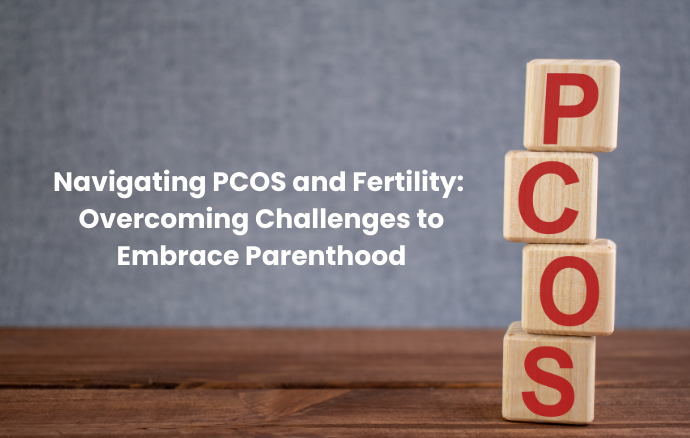Table of Contents
Polycystic Ovarian Syndrome (PCOS) is a common hormonal disorder affecting approximately 13% of people during their reproductive years. One of the most significant concerns for individuals diagnosed with PCOS is their ability to conceive. The hormonal imbalances caused by PCOS can lead to irregular periods and difficulties with ovulation, which in turn may contribute to infertility. However, while PCOS can make conception more challenging, it certainly doesn’t mean it’s impossible. With the right medical support, lifestyle adjustments, and fertility treatments, many individuals with PCOS successfully become pregnant. This article will explore PCOS in-depth, its impact on fertility, and the options available to support those looking to start or expand their families.
Understanding PCOS and Its Impact on Fertility
PCOS is a health condition primarily caused by an imbalance of reproductive hormones. In individuals with PCOS, the ovaries produce higher-than-normal levels of androgens, which are sometimes referred to as “male hormones” though both men and women have them. Additionally, individuals with PCOS may experience insulin resistance, causing their bodies to produce excess insulin. This hormonal imbalance leads to several symptoms, including irregular menstrual cycles, excess body hair growth, acne, weight gain, and ovarian cysts.
One of the most significant effects of PCOS is its impact on ovulation. Ovulation is the process of releasing a mature egg from the ovary, which is essential for natural conception. In individuals with PCOS, irregular menstrual cycles often mean ovulation is either infrequent or absent, making it difficult to conceive. However, it’s important to remember that having PCOS doesn’t mean you can’t get pregnant—it simply means that additional support may be necessary to help regulate hormones and promote ovulation.
How PCOS Affects Ovulation and Conception
For many individuals with PCOS, irregular periods can indicate issues with ovulation. Without consistent ovulation, the chances of fertilizing an egg naturally are reduced. However, many medical interventions and treatments can aid in improving ovulation and increasing fertility. In some cases, people with PCOS may also produce more immature eggs, which are not suitable for fertilization, further complicating the conception process.
Even though PCOS can disrupt normal reproductive functions, it is important to emphasize that treatment options are available. Many individuals with PCOS who seek medical guidance are able to conceive with the proper support and care from fertility specialists
Seeking Medical Guidance and Treatment Options
If you have been diagnosed with PCOS and are trying to get pregnant, consulting a healthcare provider is the first and most important step. A fertility specialist can evaluate your symptoms, hormonal levels, and overall health to create a personalized plan tailored to your needs.

One of the most effective methods for managing PCOS-related infertility is hormonal treatment. Medications like Clomiphene (Clomid) or Letrozole (Femara) can help stimulate ovulation in people with irregular menstrual cycles. These drugs encourage the ovaries to release a mature egg, improving the likelihood of conception.
In some cases, healthcare providers may also recommend Metformin, a medication typically used to manage insulin resistance in individuals with PCOS. Since insulin resistance plays a role in hormonal imbalances, improving insulin sensitivity can help regulate menstrual cycles and ovulation.
Fertility Treatments: IUI and IVF
When hormonal treatments alone are insufficient, assisted reproductive technologies such as Intrauterine Insemination (IUI) or In Vitro Fertilization (IVF) may be recommended. IUI involves placing sperm directly into the uterus during ovulation, while IVF entails retrieving eggs, fertilizing them in a lab, and transferring the embryo back into the uterus.
Both IUI and IVF can be successful for people with PCOS, especially when combined with hormone treatments to promote ovulation. IVF, in particular, can be a viable option for individuals who do not respond well to medications or who have more complex fertility challenges.

Surgical Options
In rare cases, surgical interventions may be recommended to enhance fertility in people with PCOS. A procedure known as ovarian drilling is sometimes used to destroy small portions of ovarian tissue that produce excess androgens, thereby helping to restore normal ovulation. While surgery is less commonly performed, it may be an option for individuals who have not had success with medications or fertility treatments.
Embracing Self-Care During Your Fertility Journey
The process of trying to conceive while managing PCOS can be emotionally and physically exhausting. Fertility challenges, regardless of their cause, often come with feelings of frustration, anxiety, and even hopelessness. It’s important to take care of not just your body, but also your mind and emotions during this journey.
Prioritize Emotional Well-Being
draining experience. It’s essential to give yourself space to process your emotions. Whether through journaling, meditation, or talking to a supportive friend or loved one, finding a way to express your feelings can provide relief and perspective.
Additionally, participating in support groups—either online or in person—can help you connect with others who are experiencing similar struggles. It can be comforting to know that you are not alone in your fertility journey, and hearing from others who have successfully conceived with PCOS can be incredibly motivating.
Lean on Your Support Network
It’s also important to stay connected with your healthcare provider and your support network throughout your fertility journey. Whether it’s seeking advice from a nurse, leaning on family and friends, or talking to a therapist, don’t hesitate to reach out when you need guidance or reassurance.
Maintaining a Healthy Lifestyle to Support Fertility
In addition to medical treatments, making certain lifestyle changes can improve your chances of conceiving with PCOS. Since weight gain and insulin resistance are often associated with PCOS, focusing on a balanced diet and regular exercise can help manage symptoms and promote hormonal balance.

Healthy Eating and Weight Management
Maintaining a healthy weight is especially important for individuals with PCOS because even a small reduction in weight can significantly improve ovulation and fertility. A diet rich in fruits, vegetables, whole grains, lean proteins, and healthy fats can help regulate blood sugar levels and improve insulin sensitivity.
Some individuals with PCOS may benefit from following a low-carbohydrate or low-glycemic diet to help control insulin resistance. Avoiding sugary and processed foods while prioritizing nutrient-dense meals can support hormonal health and overall fertility.
Exercise and Stress Reduction
Exercise can also be a powerful tool in managing PCOS symptoms. Regular physical activity helps regulate blood sugar levels, promote weight loss, and reduce insulin resistance. Activities such as walking, swimming, or yoga can be gentle yet effective ways to stay active without putting too much strain on the body.
Incorporating stress-reducing practices like mindfulness, deep breathing exercises, or yoga can also benefit your fertility journey by promoting relaxation and emotional well-being.
Conclusion: IVF as a Path to Parenthood for Those with PCOS
While PCOS can make conception challenging, IVF offers a highly effective alternative for individuals who struggle with natural pregnancy or do not respond to other treatments. By helping to stimulate egg production and improve fertilization chances, IVF bypasses many of the hurdles caused by PCOS, such as irregular ovulation.
For those with PCOS, IVF provides a proactive and hopeful path toward parenthood, supported by advanced fertility technology and expert care. Though the journey may require patience and resilience, IVF offers a viable solution for overcoming infertility and achieving the dream of having children. With the right medical guidance, IVF can turn the possibility of parenthood into reality for many with PCOS.

